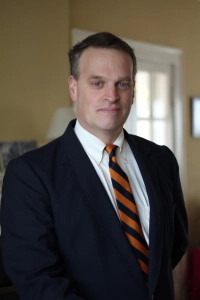On Holy Saturday, between His death and Resurrection Our Lord is engaged in what the medievals called the “Harrowing of Hell.” He descended into the Netherworld and freed all those just souls from their captivity to whom the gates of heaven had heretofore been shut because of Adam’s sin. This is the time when I imagine that Euclid, Socrates, and Aristotle issued forth in triumph following in the train led by Adam and Eve, Isaiah and Ezekiel, Moses and David, Job, Ruth and Naomi, Sarah and Hannah, all the prophets and patriarchs, Esther, Judith, and all the saints of the Old Testament. They all came forth out of the outer rings of Hell in triumph.

That is what we commemorate today.
Let us engage in our own descent, and at the risk of the taunts of those who will accuse us of descending from the sublime to the ridiculous, let us march straight down into the hell of the printed word; let us descend into the depths of the New York Times; yea, even into its very heart the opinion pages!
And what do we find there?
In an Op-Ed piece written on March 14th, 2014 written by on Ferris Jabr entitled “Why Nothing is Truly Alive” we find that life has no meaning!
Well that does it. Cancel my subscription. Up to this point I was still clinging to the question that has stumped just about everybody in the modern world, everyone, that is, who has heretofore turned their hopeful gaze towards The Old Grey Lady for a meaningful answer to the question “does life have meaning?!?”
One would think that if its readers took this paper seriously, this article alone would have been the death knell.
Fortunately for the Times, however, the paper can commit an occasional act of intellectual suicide from time to time, sustained by the fact that for its editors, in all probability, there is no truth. And so it doesn’t really matter what one prints for the entire world to see.
Nonetheless, for the classical educator, Mr Jabr’s thoughts afford an excellent exemplification of a point that I continually try to impress upon my students.
Classical Education makes a difference.
What is the difference?
A life and death difference, or at least a Life has meaning and life has no meaning difference.
Interestingly Mr. Jabr bases his argument upon the pure Kantian priniciple that we cannot know things. Or rather the ideas that we have in our head about things amount to mental categories which we impose upon things. Jabr writes,
Sometimes the brain creates a representation of a thing: light bounces off a pine tree and into our eyes; molecules waft from its needles and ping neurons in our nose; the brain instantly weaves together these sensations with our memories to create a mental model of that tree. Other times the brain develops a pure concept based on observations — a useful way of thinking about the world. Our idealized notion of “a tree” is a pure concept. There is no such thing as “a tree” in the world outside the mind. Rather, there are billions of individual plants we have collectively named trees. You might think botanists have a precise unfailing definition of a tree — they don’t. Sometimes it’s really difficult to say whether a plant is a tree or shrub because “tree” and “shrub” are not properties intrinsic to plants — they are ideas we impinged on them.
This amounts to a sort of nominalism. The names we have for things are useful categories but do not stand for any thing real outside the mind.
There is no such thing as “a tree” in the world outside the mind.
Proceeding from this fundamental but significant confusion about our knowledge, Mr. Jabr then proceeds to say that there is no such thing as life either.
Likewise, “life” is an idea. We find it useful to think of some things as alive and others as inanimate, but this division exists only in our heads.
And then note how quickly Mr. Jabr descends into a purely utilitarian view.
“We must accept that the concept of life sometimes has its pragmatic value for our particular human purposes, but it does not reflect the reality of the universe outside the mind.”
Moderns like Mr. Jabr are always unfailingly discourteous to serious thinkers before them. They are condescendingly dismissive of Aquinas, dismissive of Aristotle, dismissive of the entire Greek tradition. Based upon his superficial attempt at understanding the thought that has preceded his own Jabr simply says,
What is life? Science cannot tell us. Since the time of Aristotle, philosophers and scientists have struggled and failed to produce a precise, universally accepted definition of life.
But the great Jabr has it all figured out. And the answer is that the question ‘what is life’ doesn’t matter. Speaking about the mechanical monsters (“strandbeest”) that Dutch artist Theo Jansen has made his life’s work, Jabr says,
It does not matter whether this magnificent entity is alive or not. Just look at it go.
Education makes a difference.





This whole line of thought is self-defeating,
How does he know that what is in our minds does not reflect the reality outside of it? He would only know this if he knew that reality in the first place, so that he could compare our ideas to the reality and know that they don’t match.
Also, he says that because we do not have a definition of life that everyone agrees to, it doesn’t exist. Does this mean that life starts existing if we all agreed on a definition?
Bizarre.